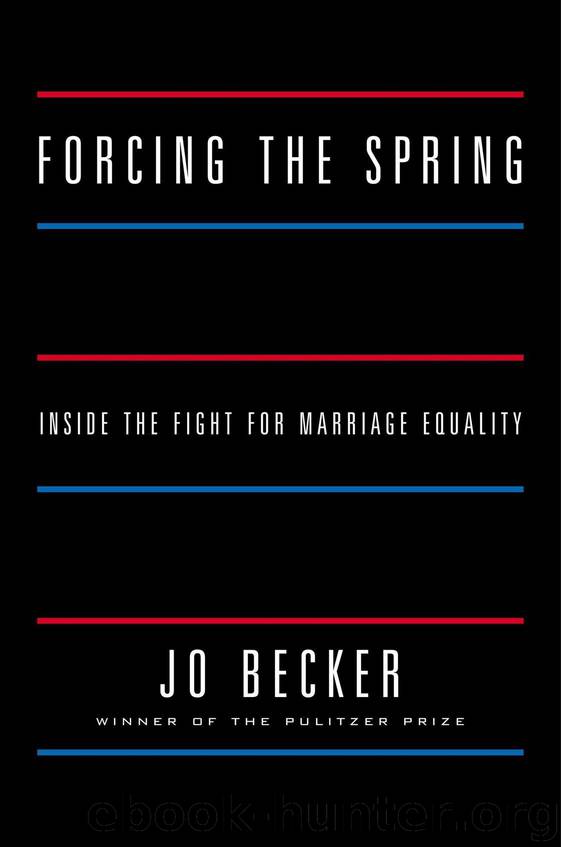Forcing the Spring: Inside the Fight for Marriage Equality by Becker Jo

Author:Becker, Jo [Becker, Jo]
Language: eng
Format: mobi, epub
Publisher: Penguin Group US
Published: 2014-04-22T00:00:00+00:00
On a personal level, Eric Holder had never liked DOMA. Neither had Tony West. Both were African Americans who saw distinct parallels between the civil rights battles of the past and the present-day struggle for marriage equality. Standing up for a law both felt was discriminatory felt, as West put it, like standing “on the wrong side of history.”
So when the president’s displeasure filtered back to the Justice Department, neither man was averse to taking a second look at the department’s position. But it was not as easy for them to drop the defense of a law passed by Congress as it been for the governor and the attorney general of California to cease defending a law passed by state voters.
The ethos of the department is that the rule of law and the founders’ vision of three coequal branches of government require the executive branch to strongly defend laws passed by the legislative branch. Both men were steeped in the department’s traditions, having landed their first jobs there when they were fresh out of law school. However personally distasteful they found DOMA, both knew that if the Justice Department was going to take the momentous step of declining to defend a duly enacted law of Congress, it had better have a damned good legal reason.
To avoid any perception that the department’s legal judgments are politically motivated, appointees like West generally, though not always, defer to the recommendations of civil service line lawyers. The line lawyers’ initial take was that the department had a duty to make any and all arguments in defense of DOMA. So West arranged a series of meetings with gay activists so they could hear the critique of the law’s constitutionality directly from the community that it impacted.
Since the Smelt dustup, three other DOMA challenges had been filed. But all were in circuit courts of appeal that had already decided that the highly deferential rational basis test—requiring only that the law be rationally related to some legitimate government purpose—was the proper standard of review for laws that target gays and lesbians.
The department had been arguing for years that DOMA was rational. It would be burdensome for the federal government to have to administer benefit programs on a state-by-state basis, depending on the marriage laws in effect, the argument went, and so it was rational to want a uniform rule that simply defined marriage as a union between a man and a woman. The courts would not give the department’s position much, if any, weight if it suddenly did an about-face, especially given the leniency of the standard. And it could damage the institution’s credibility in other cases.
But as West put it, “it didn’t take a rocket scientist” to know that one of these days someone was going to file a challenge to DOMA in a circuit that had yet to decide whether gays and lesbians should be considered a suspect class, where it could be argued that heightened scrutiny applied, as Walker had found it did in the Prop 8 case.
Download
Forcing the Spring: Inside the Fight for Marriage Equality by Becker Jo.epub
This site does not store any files on its server. We only index and link to content provided by other sites. Please contact the content providers to delete copyright contents if any and email us, we'll remove relevant links or contents immediately.
| African-American Studies | Asian American Studies |
| Disabled | Ethnic Studies |
| Hispanic American Studies | LGBT |
| Minority Studies | Native American Studies |
Cecilia; Or, Memoirs of an Heiress — Volume 1 by Fanny Burney(31333)
Cecilia; Or, Memoirs of an Heiress — Volume 3 by Fanny Burney(30934)
Cecilia; Or, Memoirs of an Heiress — Volume 2 by Fanny Burney(30889)
The Great Music City by Andrea Baker(21313)
We're Going to Need More Wine by Gabrielle Union(18074)
Bombshells: Glamour Girls of a Lifetime by Sullivan Steve(13109)
Pimp by Iceberg Slim(12931)
All the Missing Girls by Megan Miranda(12749)
Fifty Shades Freed by E L James(12451)
Norse Mythology by Gaiman Neil(11883)
Talking to Strangers by Malcolm Gladwell(11879)
Crazy Rich Asians by Kevin Kwan(8349)
Mindhunter: Inside the FBI's Elite Serial Crime Unit by John E. Douglas & Mark Olshaker(7834)
The Lost Art of Listening by Michael P. Nichols(6474)
Enlightenment Now: The Case for Reason, Science, Humanism, and Progress by Steven Pinker(6406)
Bad Blood by John Carreyrou(5769)
The Four Agreements by Don Miguel Ruiz(5511)
Weapons of Math Destruction by Cathy O'Neil(5037)
We Need to Talk by Celeste Headlee(4870)
